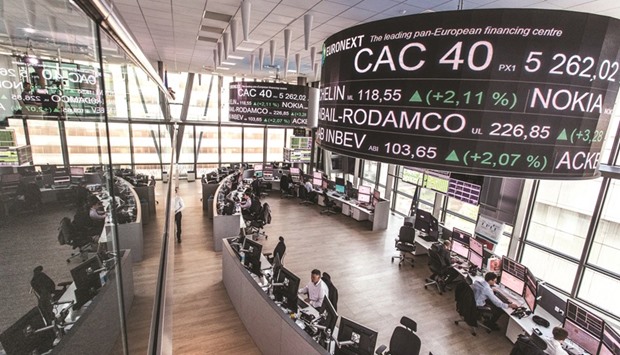European stock markets rose yesterday as French presidential frontrunner Emmanuel Macron was seen winning a crunch election debate ahead of Sunday’s run-off vote.
Traders were also eyeing US monetary policy after the Federal Reserve left open the possibility of hiking interest rates next month despite slow growth in the world’s top economy.
The French market outperformed its European counterparts, with the Paris CAC 40 fizzing 1.4% higher to reach levels not seen since 2008 as traders digested Wednesday night’s debate between Macron and the far-right Marine Le Pen.
Frankfurt’s DAX 30 meanwhile climbed 1.0% to a new record close, ending the first time above 12,600 points at 12,647.78.
A drop in oil and metals prices penalised London’s benchmark FTSE 100 index, which closed with a gain of 0.2%.
Across Europe, London’s FTSE 100 closed up UP 0.2% at 7,248.10 points; Frankfurt’s DAX 30 was up 1.0% at 12,647.78, while Paris’ CAC 40 rose 1.4% at 5,372.42.
“European assets are in high demand...with the euro moving back above $1.09 and the DAX at an all-time high, as Emmanuel Macron was deemed to have trounced his rival in last night’s debate,” said Chris Beauchamp, chief market analyst at IG traders.
The centrist Macron and far-right Le Pen clashed over terrorism, the economy and Europe in a bad-tempered TV debate that laid bare their profoundly different visions for the country.
The duel ahead of Sunday’s election was billed as a confrontation between Macron’s call for openness and pro-market reforms and Le Pen’s France-first nationalism.
“It’s been a day of fairly decent earnings updates, though it has been helped by the failure of French presidential candidate Marine Le Pen to lay a glove on Emmanuel Macron in last night’s final presidential debate, ahead of this weekend’s final vote,” said analyst Michael Hewson at CMC Markets.
In foreign exchange markets, the dollar fell back against the euro following the debate and after gains for the US currency Wednesday when the Federal Reserve opened the door for another US interest rate hike.
Meanwhile, the oil prices slumped to its lowest levels since Opec and Russia agreed in November to cut back production in a bid to raise prices.
“Oil prices have slipped back again on reports that Russia hasn’t made a decision on extending the output deal into the second half this year,” said Hewson.
He noted that it took Russia until April to meet its quota target agreed at the end of last year, which “suggests a rather lukewarm approach”.
On the corporate front, shares in HSBC topped the FTSE 100 leader board, jumping 2.9% after the banking titan posted a rise in pre-tax profits, excluding one-off charges.
In Frankfurt, Adidas climbed 0.8% as the German sporting goods maker voiced confidence over meeting its objectives for the year, after a huge leap in quarterly profits.
Wall Street stocks were narrowly mixed ahead of an expected US congressional vote on health care seen as a proxy for President Donald Trump’s agenda.
Focus is turning also to the release today of the US government’s jobs creation data for April and statements from Fed boss Janet Yellen as well as other top bank officials, which could provide some forward guidance to markets.
Despite the positive spin from the Fed, Asian equities mostly struggled yesterday in a week that has seen several markets closed for public holidays.

Stock prices information is displayed on a screen as it hangs above the Paris Stock Exchange, operated by Euronext, in La Defense business district in Paris (file). The French market outperformed its European counterparts yesterday, with the CAC 40 fizzing 1.4% higher to reach levels not seen since 2008.
